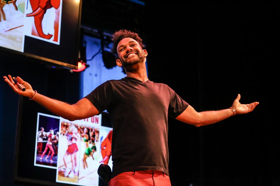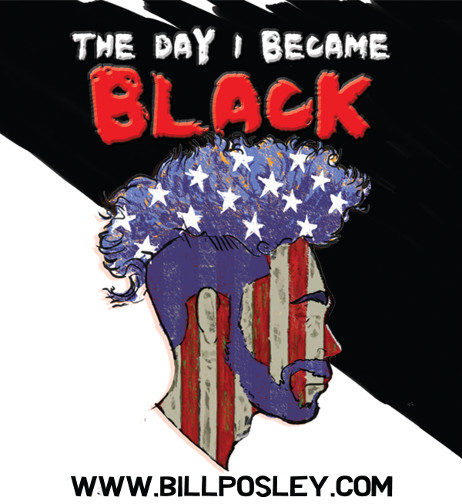Interview: Bill Posley and THE DAY I BECAME BLACK at SoHo Playhouse Through 5/6

The SoHo Playhouse announced that THE DAY I BECAME BLACK, created, written and performed by Bill Posley and directed by Bente Engelstoft will be extended through May 6.
Nominated for Best Solo Show and Top of the Fringe at the 2018 Hollywood Fringe Festival, THE DAY I BECAME BLACK tackles these themes not just through a Black lens, but through a Biracial one as well. The population of multi-racial people is growing three times faster than the population as a whole. We've all been forced to identify with something that didn't feel quite right. This show finds the comedy in the struggle of trying to fit in and trying to just be yourself. The show is suggested for ages 18 and up.
Posley hails from a blue-collar Massachusetts family, but now calls Los Angeles his home. His father was a black activist who married a white woman. Bill served as a soldier in the United States Army. Shortly after high school, he was activated and sent to Iraq. After serving 15 months overseas, he accumulated all the footage he had taken during his tour and made a short documentary that got him into film school. As a comedian, Bill is an alumnus from UCB, I.O. and Second City. He's shared the Stand-Up stage with comedians such as Lewis Black, Tosh and Joe Rogan. Bill was in the 2017 CBS Diversity Showcase, was a 2017 JFL New Face of Comedy and just got off this season of CBS's "MacGyver." You can also see him of Fox's "9-1-1" and he'll be in the new season of Netflix's "Glow." Bill just wrapped his first season of writing on CBS's "The Neighborhood" with Cedric the Entertainer. Fun fact: he was on "Survivor." Bill's experience leaves him with a very unique voice and an eclectic perspective of life.
Broadwayworld.com had the pleasure of interviewing Bill Posley about his career and his current show.
Were you interested in the performing arts as a youth?
As a youth, the only performing I was into was being the class clown. Growing up in my neighborhood there wasn't anybody who was theatrical or into the arts. You played sports and that was about it. I went to a small Catholic school in the hood. It was like a "Sister Act 2" situation, but Whoopi Goldberg wasn't coming to teach us how to express ourselves. The only time we would put on performances was during the stations of the cross.
Who are some of the people who have influenced your career?
Dave Chapelle is a huge inspiration of mine. His stand up taught me that comedy can be meaningful and say something, and that sometimes when the audience is laughing they didn't get the heart of the joke.
Mr. Bean is also a hero of mine. He taught me that sometimes words can get in the way. Your body can be the most powerful instrument that you have, so make sure you understand how to use it to its fullest capacity.
Marina Abramovic is an amazing performance artist. She taught me to get out of my comfort zone, and the power of getting the audience out of their comfort zone. When you are willing to live in the uncomfortable, your performance becomes even more memorable, and not just for the audience, but for the artist as well. You always have to be pushing yourself. Oh and lastly, RuPaul, because come on, she's RuPaul!
Why do you think "The Day I Became Black" is making such a big impression on its audiences?
First off, the show is about the search for identity, which is something we all deal with and can relate to. Secondly, audiences have never really seen an in-depth look at a biracial life. It makes people learn a new perspective and think about things differently.
With the biracial population growing at three times the rate of the overall population, it amazes me that there has never been a substantial story told about our experience. For years biracial actors have played the race they look like. We even made Lisa Bonet all black. Shame on us. I have had biracial people come up after a performance and say "that is my story," and they are able to connect to feelings about themselves they did not know they had. As a kid, I would have killed to see an accurate representation of a biracial character, so I would have known me and my brother weren't the only ones.
What are some of the challenges of writing and performing a one-man show.
One of the challenges that comes with a one-man show is fighting against the stigma of a one-man show. A lot of people may consider them self -indulgent, boring, or monologue-y. So trying to make sure that the performance stays engaging, interesting, and active is very important to me.
Also a one-man show is demanding because I have a lot more responsibility as the producer, writer, performer, and creator. When I'm on stage I can't pass the ball to another actor, it's all me. And off stage, I am doing rewrites trying to improve the show every night. Sometimes it can be a little bit more physically demanding than maybe your traditional play.
Tell us a little about the team who made "The Day I Became Black" happen.
The team who made The Day I Became Black happen is a group of the most talented women in the world.
My director is Bente Engelstoft, a biracial woman, who is currently an Emmy-nominated writer on Ellen. When she came on board she injected a whole new life into the project, not just with her biracial experience, but her sense of humor and unique vision as a storyteller.
My Producer is Kristen Boule, who has dedicated so much time and energy to making sure that the show is what it is today. Without her we wouldn't be running, and definitely not in New York. She takes care of everything from stage managing, to flyers, to promotion, to being my therapist. When I came to her with the project I had no idea where to begin. She laid out a plan and executed it in such a way that I don't know if the show would have happened without her leadership.
Next is a woman named Brittany Belland, who sadly is no longer with us. She passed away last year. While I was workshopping the show last year, she was the first person to come up to me and say, "you have something here, now do something with it." It was because of her that the show got its first life. She contributed ideas from the beginning of the process that are still a part of the show today, and included in the powerful final video of the show. I am forever grateful to her and I wish she knew how much her work is being seen. I hope that this show honors what she wanted me to do with it.
Lastly, my partner Honora Talbott. She has been with me every step of the way. I promise you she could do the show by this point, because she has helped me rehearse it so much. I couldn't have asked for a more supportive, creative, and talented woman to be in my life and I am so blessed. She, like the other women, is far more talented than me.
What would you like audiences to know about the show.
That you don't have to be biracial to relate. I've had people from different walks of life come up to me after the show and tell me about something that they related to.
A woman came up to me whose parents were Jewish and Catholic and she related to feeling like an outsider. Several members of the LGBT community have told me they understand the struggle of somebody trying to force an identity on them. Interracial couples have shared that because of my show, they're going to talk to their children about identity in a different way, or that they feel they are better able to relate to what their children may have gone through.
Can you share with us some of your future plans?
One of my future plans is to do another one-man show around my time in the military called "The Day I Joined The Army." I would like to continue to take complex subject matter and make it more relatable to audiences. I want to "tickle the ribs to inject the medicine" as they say.
Follow Bill Posley on Instagram at https://www.instagram.com/billposley.
Follow THE DAY I BECAME BLACK on social media. Facebook at https://www.facebook.com/thedayibecameblack; Twitter at https://twitter.com/billposley; and on Instagram at https://www.instagram.com/thedayibecameblack.

THE DAY I BECAME BLACK runs for 70 minutes with no intermission. The Soho Playhouse is located at 15 Vandam Street between 6th Avenue and Varick Street in New York City. Performances are Thursdays - Saturdays at 7pm, Sundays at 3pm and Mondays at 9pm. The Sunday, April 21 show is at 8pm. Ages 18+. Tickets are $39. Purchase at https://www.BillPosley.com or by calling 1-888-596-1027. For more info visit https://www.sohoplayhouse.com/the-day-i-became-black.
Photo Credit: Courtesy of Bill Posley
Comments
Videos

